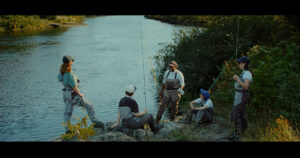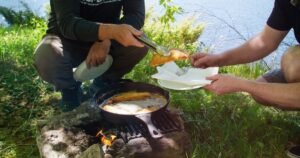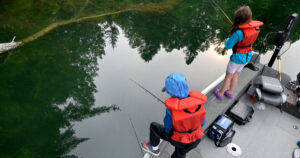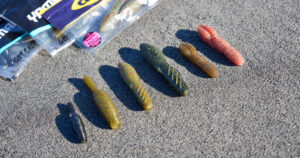
Getting hooked
Get Hooked is a six-part documentary series following four queer millennial women on fishing excursions across Ontario.
Home | Hoping everything goes well in the cold
A few years ago, I was invited to go on a late-season waterfowl hunt with one of our writers and a friend. It was a cold December day, with crust ice around the edge of the bay as we set out in a 14-foot aluminum tiller to a blind in a marsh in southcentral Ontario. We had life jackets over several layers of camo, warm boots, guns, ammo, burlap tarps, and more decoys than we needed. After several hours, we were getting cold. The wind was picking up, and so were the waves for the trip back to the makeshift launch. Massive snowflakes, like the CGI ones you see in over-the-top Hallmark Christmas movies (I have a softer side), were falling, making everything wet and heavy, and visibility challenging. It was one of those times that I think everyone who enjoys the outdoors, especially during the shoulder seasons, says to themselves, “I hope this goes well.” We took our time, zigzagging into the waves so we’d meet them head-on. Cold but safe We made it back, a little chilled and wet, but safe. All that ride I was thinking: what’s my game plan if we capsize? Kick off my boots and jacket and try to swim to shore as best as I could, or maybe grab a bag of decoys and try to float. Stay, go? It’s like the classic, “What do you do if you cross an ornery bear in the woods and all you have is a fishing rod on your way to your favourite brook trout stream… yell or play dead?” It’s the stuff that keeps hunt-camp philosophers up long into the night. To be honest, I didn’t really know what my best option was if I found myself marsh bobbing in December. Canadian Safe Boating Council So, when we were contacted by the Canadian Safe Boating Council to attend a cold-water awareness workshop last year, Assistant Editor Steve Galea and I took part in the two-evening online course. It was instructed by Dr. Gordon Giesbrecht, a leading authority on hypothermia, to learn everything we needed to know to survive an accidental cold-water immersion and to help others who may have become hypothermic. Find out more about what we learned and how to take part in an in online or in-person class near you, by clicking here. It was well worth the time to learn skills I
Understanding and determining your maximum lethal range for long-range turkey hunting to ensure ethical, accurate, and effective shots.
Read MoreAt dawn, toms listen for hen yelps—but once they leave the roost and find hens, their response becomes less predictable.
Read More
Get Hooked is a six-part documentary series following four queer millennial women on fishing excursions across Ontario.

Three Ontario lodges share their favorite shore lunch fish recipes, all cooked over the fire with their own signature flavors and style.

Permethrin remains unavailable in Canada due to delays caused by a lengthy approval process blocking its market entry.

Fishing with my kids has taught me that slowing down, making it fun, and being present matter more than catching the biggest fish.

Poop baits are so realistic, it’s nearly impossible to fish them wrong—no matter your technique, fish can’t help but strike.

Morel cream sauce brings a favorite spring flavor to a luxurious dish of fish and wild ramps, perfect for seasonal dining.
Contact Information
PO Box 2800 / 4601 Guthrie Dr.
Peterborough, Ontario Canada K9J 8L5
Phone: 705-748-OFAH (6324)
Fax: 705-748-9577
Join Our Newsletter
Watch
Shop
Follow